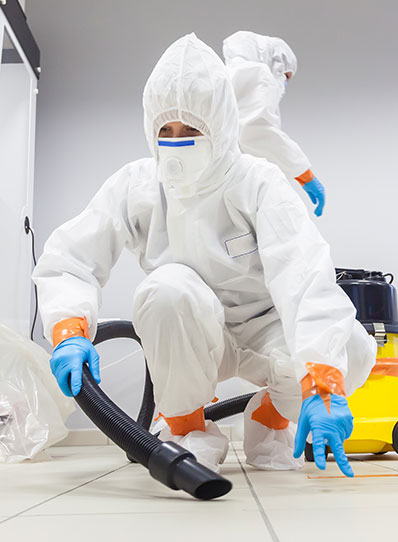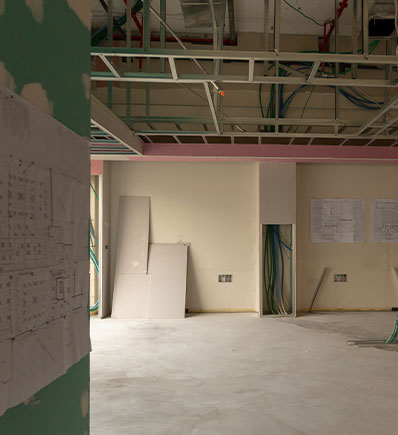Transitioning a laboratory to a new space can be a complex and delicate process.
Whether you’re transitioning to a new lab, repurposing an existing office space, or adding additional lab space, the process requires careful planning, expertise, and specialized handling.
Not only do you need to address the physical relocation, but you also must consider regulatory requirements, hazardous material disposal, and equipment removal.
Getting a Lab Ready for the Next Location
1. Understand the Lab’s Current Setup and Future Requirements
Before beginning the transition, take the time to thoroughly assess the lab’s current layout and setup. Every lab is unique, with different equipment, utilities, and safety systems in place. A detailed understanding of these components will help determine what needs to be retained, modified, or removed.
- Assess Equipment and Fixtures: Identify what equipment and instruments are still functional and whether they can be relocated, resold, or disposed of. Some specialized lab equipment can be valuable if it’s no longer needed for your current use.
- Identify Leased and Specialty Equipment: Figuring out which items are owned and which are leased will help you assess which items have specific preparation needs for transport. Some items may need to be handled exclusively by the manufacturer for your move.
- Evaluate Time-Sensitive Challenges: Cold storage items, such as freezers, refrigerators, chillers, and loose items within them should be a consideration. Identify the temperatures these items need to be kept at and the duration of the move. Some larger moves may require portable generators to keep these devices functional. Additionally, assess whether the move will impact long term existing experiments that cannot be disturbed.

2. Address Safety and Compliance
Labs often contain hazardous materials, chemicals, or biological agents that need to be handled with extreme care. Depending on the type of research or experiments previously conducted, you may need to follow strict safety protocols and regulatory guidelines to relocating the lab or decommissioning the space properly.

- Hazardous Materials: Work with licensed professionals who specialize in hazardous materials to remove and dispose of chemicals, biological samples, and waste according to OSHA and EPA guidelines.
- Decontamination: Labs with biological or chemical contamination may require thorough cleaning and decontamination. This is especially important if the lab is transitioning to a non-scientific use. A professional decommissioning team will know the best procedures for ensuring the space is safe for future use.
- Compliance with Regulations: Regulatory compliance is critical. Whether you’re working with radioactive materials, hazardous chemicals, or general waste, make sure that all local, state, and federal regulations are followed to avoid costly penalties.
3. Plan for Equipment and Inventory Relocation or Removal
Once you have an understanding of the equipment and fixtures in the lab, you can begin planning for their relocation or removal. Depending on the lab’s intended next use, you may need to relocate specific equipment, remove outdated machinery, or install new systems altogether.
- Relocation or Resale: Some of your laboratory equipment may be valuable for resale or relocation to your next facility. If the equipment unneeded in the new space and still in good working condition, consider reaching out to other labs, institutions, or companies that may benefit from it. A specialist can help facilitate the sale or transfer of equipment.
- Disposal of Unwanted Items: Equipment and materials that are outdated, broken, or no longer needed may need to be properly disposed of. Choose a reliable waste management service that can handle electronics, chemicals, and any other materials that require special handling.
4. Update Infrastructure to Suit New Needs
If your lab is transitioning to a different type of space, such as offices or classrooms, infrastructure changes will likely be necessary. Labs typically require spaces designed with specialized plumbing, ventilation, power sources, and storage needs.
- Utility Upgrades: In some cases, the new space’s utility systems (such as gas lines, HVAC, and water supply) will need to be updated to meet the lab’s requirements. Work with contractors who understand the specific needs of the new function of the space.
- Flooring and Layout Changes: If the space is being converted into a lab, you’ll need to address flooring, wall modifications, and overall layout. Labs often have specialized flooring to handle spills or heavy equipment. A professional team can help redesign the space efficiently.

5. Hire a Professional Transition Team
The process of relocating a lab can be complicated, particularly when it comes to hazardous materials and sensitive equipment. Hiring a professional moving team that specializes in lab spaces can save time, reduce risks, and ensure the process is done correctly.
A specialized team can handle:
- Inventory management
- Safe removal of chemicals and hazardous materials
- Equipment relocation or disposal
- Compliance with safety and regulatory standards
- Space redesign and construction
Working with a team that has experience in these types of relocations ensures the job is done right, from start to finish. It also helps to minimize any potential delays or costly mistakes, ensuring that the space is ready for its next purpose on time.
Have More Questions About Lab Moves?
Our experienced team can help. Get your free consultation today!
Learn MoreTransition Your Lab Space Correctly
Transitioning a lab to a new space requires careful planning, regulatory compliance, and specialized handling. From assessing the equipment and infrastructure to managing hazardous materials and decommissioning the space safely, there’s a lot to consider. With the right planning and professional support, the move can be smooth and cost-effective.
At Corovan, we specialize in providing lab relocations. Our expert team ensures that every detail of equipment removal and relocation is covered.”
If you’re looking to relocate your lab, contact us today to learn more about our services and how we can help make the process efficient and cost-effective.
